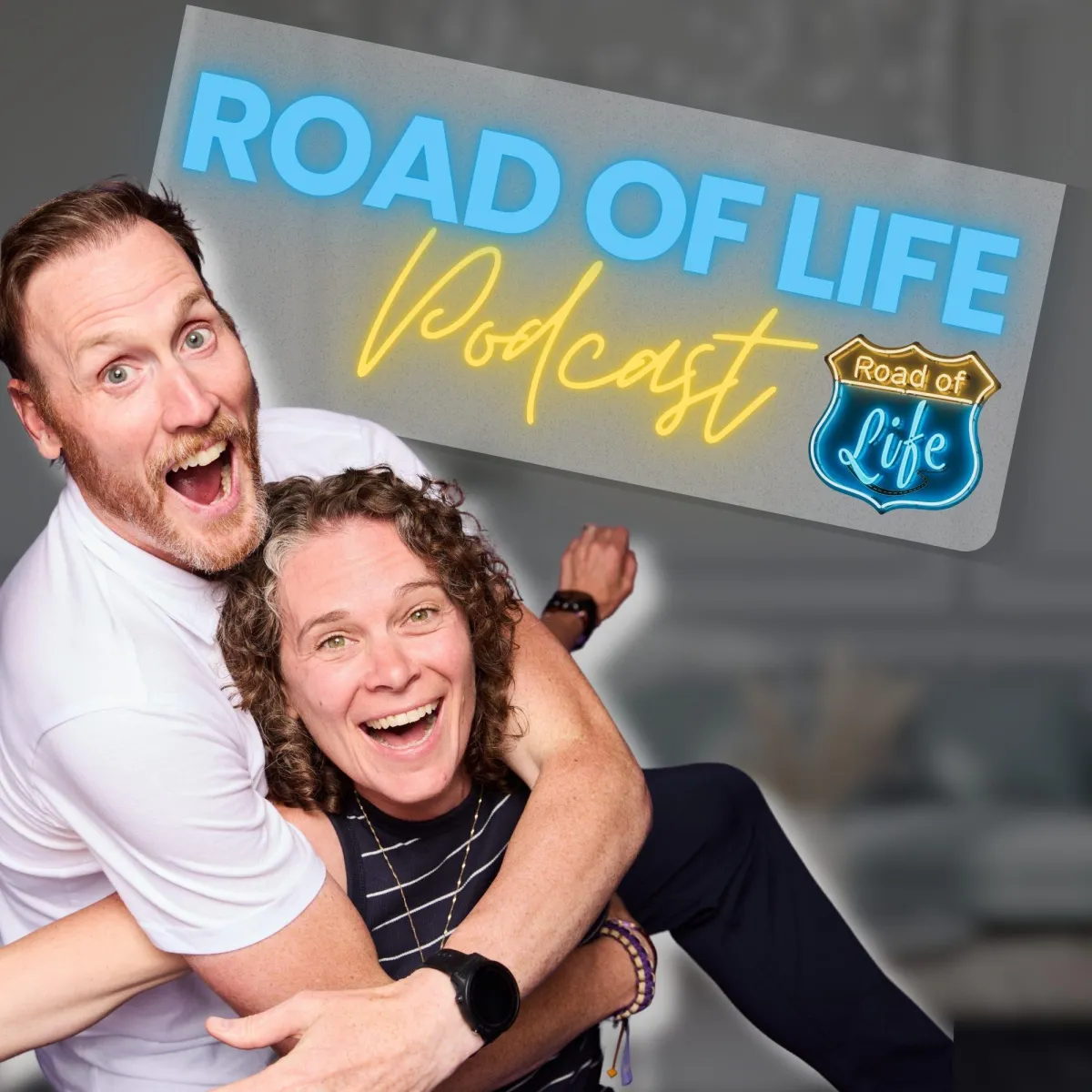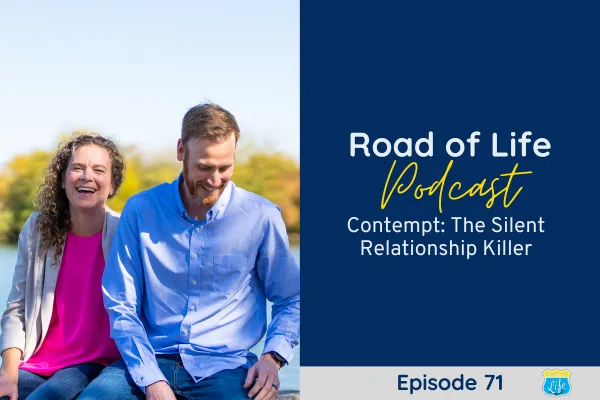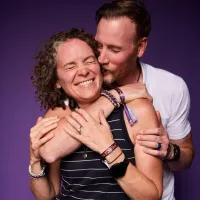
The
Road of Life
Podcast
With Meredith MacKay & Craig Bennett
Listen

72. Defensiveness: The Third Horseman Sabotaging Your Relationship
Listen Now
Episode Transcription
Welcome back to another episode of the Road to Life podcast with Meredith and Craig. the last few episodes, we've been talking about the four horsemen of the apocalypse. And so John and Julie Gottman, big time researchers in the space of relationships and marriage have identified four critical things that if you see them in your relationship, it's a bad sign.
And those are one Criticism, which we talked about a couple weeks ago. Contempt, which we talked about last week. Defensiveness, which we're going to talk about this week. And Stonewalling, which we're going to talk about next week. Yep. So if you missed the last two weeks, definitely Check those out. Go back, check them out, because we started with Criticism.
It's sort of the sneakiest one that we probably see a lot of. And then last week we talked about Contempt, which is the Criticism on steroids, the mean older sibling of criticism. And if there was one horseman of the apocalypse, it would be contempt. It is the number one predictor of divorce according to the Guttman's.
Correct. And so those are the last two weeks. So go back and listen to those if you haven't already. And today we're going to talk about defensiveness. Yeah. Defensiveness is basically our go to feeling our go to reaction when we're feeling attacked. When we feel like someone's coming at us, we're feeling blamed the default reaction inside for so many of us is defensiveness.
For me, it's something that I battle constantly. And it, I think for me, stems from my feelings of unworthiness, of not feeling good enough. So that when someone maybe raising something super productively in a constructive way, but I hear it as what you did wasn't enough. It wasn't good enough.
It didn't hit the mark. You didn't do it right. It definitely stems from perfectionism mentality. I have and still do have to battle defensiveness for sure. , but what is defensiveness? So defensiveness, For those who may or may not be unfamiliar with the feeling.
I'm sure you've had it, but let's, define it so that you can be like, Oh, that's defensiveness. Oh, when I do that, that's defensiveness. So it's when you deflect blame or make excuses or you play the victim instead of taking full responsibility for something. Yeah. And this is great, because this lines right up with our 200 percent marriage mindset, in fact all of them do, but this one especially lines right up with the 200 percent marriage mindset.
And that you are 100 percent responsible for, well, everything in your life, but if we're talking about the relationship side, you are 100 percent responsible for your relationship and for how you show up in that relationship. And when we start making excuses, playing the victim. And blame shifting. So blame shifting.
We are not showing up accountable or responsible. . Yeah. Well, I didn't do it, but you didn't remind me. Yeah. Why didn't you wake me up? Why didn't you tell me? Yeah. , why didn't you bring that to me? Yeah. I forgot it, but like you didn't remind me about it. . And then, yeah, .
It didn't get done because you didn't bring it to me. Something like that. A hundred percent. Great example. That is. A great example of not taking 100 percent responsibility. Something happened or didn't happen and you put the blame on somebody else when there was something you could have done differently that would have changed the outcome.
And there's always something you could have done differently. Then there's making excuses. So, well, I was just too busy. I've got so much going on. What am I supposed to do? I'm overwhelmed here. I can't get to it. Like we're in the middle of doing a discipline project 33. We're in phase two of it doing discipline.
And there was a couple of days last week that were pretty cold that I did not want to get outside and go for a walk. Yeah. , but that was part of the, project. So we had to get outside and go for the walk. I could feel the excuses bubbling up inside of me that we were really busy. So we had to go earlier one morning when it was still a lot colder.
I could feel the excuses, like, Ugh, I'm too busy. It's too cold. There's a million and one excuses for everything that you don't want to do. And so making excuses is a beautiful example of being defensive. Because, really, when we're defensive, We've let ourselves down and we kind of know it on the inside.
So we're doing something. Anything we can do to make ourselves feel a little better, that's blaming someone else, or it's making an excuse that it's not my fault that I didn't do the thing I said I would do. Yeah. And the other way that defensiveness manifests is playing the victim. Mm hmm. Why is it always my fault?
Why is it always my responsibility? Yeah, why, is it all on me? Those are the three big ways that defensiveness will manifest in your relationship. So if you catch yourself doing any of those three things or, you know, those, examples are specific, or, you know, if you're doing something similar to those examples, then there's likely some defensiveness going on.
And again, it's, not your fault. It's something that, , we just, we are born knowing nothing, literally nothing. We don't, we're just drool and poop machines. We know nothing. And so we rely on, society and our parents and everyone around us to teach us stuff. So defensiveness when it comes up is likely something, a learned behavior, something that you were, brought up with.
And so a lot of times to your point, when it comes from. feeling insecure or less than or unworthy and that's really what perfectionist stems from is I have to be perfect because that's how I get my my self worth my validation comes from my always delivering and always doing it right and the minute I Don't do something exactly the way someone else wanted it done.
Then all of a sudden my insecurities boil to the surface and I don't feel good enough anymore and therefore I need to put that back on someone else cause I am not willing to accept that. Right. And so a lot of this can come from like, if you grew up in an environment where it wasn't really safe to admit fault, like if you, Maybe in like a very strict household or something where if you were wrong or did something incorrectly, you got punished for it.
Punished, or maybe were the other receiving a contempt or criticism. Right. Then, , that would be a reason why the defensiveness comes up for you. Yeah. And to your point, it's not your fault. because , we talk about this a lot, but there's an unworthiness epidemic in the world and it's not just you and it's not just me, it's, all of us for the most part and it's, again, not our fault because , we've learned that growing up and our economy is predicated on none of us feeling good enough so that we will buy all the things to make us feel good enough and so it's not our fault That we don't feel good enough.
So it's not our fault that the defensiveness comes out. However, it is now our responsibility to deal with that so that we're not bringing defensiveness into our relationship so that we're not bringing our unworthiness and our self sabotage into our relationships. Because we, all want to have thriving, productive relationships that lift us up and make us feel great and help drive us toward our dreams.
And if we're bringing defensiveness and all that unworthiness nonsense into our relationships. We're not going to get there. And another thing is, that we all have this fight or flight response, right? Like we grow up with it. It's like an evolutionary thing. Like it's something that we just have as human beings, fight or flight.
When we feel threatened, it kicks right in. Yeah. And so sometimes that's fight. And that's where defensiveness comes in is like, You, throw up your guard and, you start to shift blame or, you know, the other things. Yeah. , exactly. But like how does it manifest or like what's the impact if like defensiveness comes up in your relationship?
What does that mean for your relationship? Well, Defensiveness is a really unproductive way to have a disagreement. If you're unproductive in that it escalates it correct Yeah, like it doesn't resolve it doesn't resolve anything and we talk a lot about having productive conflict in a relationship because it's a red flag if you never disagree if there's no conflict in your relationship Then one of you is not being your full self and that's a whole other toxic problem in a relationship So conflict is an important part of every relationship And in that situation, you have the opportunity to have a productive conflict or an unproductive conflict.
And if you've got defensiveness, so you're throwing up your guard in this conversation and unable to find common ground and productively work through whatever the disagreement is, because you're constantly throwing everything back as a, you know, shifting the blame and making excuses and not taking 100 percent responsibility for your behavior and the state of your relationship, Then you're not going to find a productive outcome to that conflict.
So it escalates every disagreement you're in. And it just cycles blame. Like you feel defensive. So you blame, and then the other person feels defensive. So they blame. And it's just a back and forth. Like you're basically hitting the blame fall back and forth over the net. And you've just, to your point, you never actually resolve anything that just spirals into bad places.
Yeah. and nothing ever gets resolved and resentment just builds and you just don't want resentment in your relationship. Correct. Yeah. How do we overcome defensiveness? What's the antidote? The antidote to defensiveness? There's a couple. I mean the first one is the 200 percent marriage mindset.
It's taking full responsibility. It's not seeing everything as an attack on you as a person, and trying to view these conflicts as Obstacles to overcome together, be on the same team and take 100 percent responsibility instead of the example we used earlier of like, what am I supposed to do? I'm overwhelmed.
I'm busy. I've got so much going on. I forgot. What am I supposed to do instead of that? It's you know what? You're right. I've committed to doing that. I said I was going to do it. I missed the boat. I didn't do it. I'll set a reminder next time. Exactly right. That's taking responsibility. That's taking responsibility instead of you.
Shifting blame and getting defensive. Oh yeah. Instead of making it, you didn't wake me up. You didn't remind me. Yeah. You know what? I could have set a reminder for myself. Exactly.
Active listening. Listen to understand what they're saying. Not to just respond. A lot of times we get defensive. We're listening to just get our, response out and to, Get defensive and basically shift the blame off of ourselves. When if we just took a minute to really hear the other person to understand where they're coming from, it makes it a lot easier.
It's almost like if you could pull yourself out of the, conversation and look at the conversation from like a higher vantage point, take a different perspective in the conversation and see it as an opportunity to get closer. See it as an opportunity to improve the relationship.
See it as an opportunity to improve yourself. Instead of feeling attacked and blamed, like you get to decide how you feel about something. You get to decide the story you tell yourself about every situation. So if you want to tell yourself the story that I suck, I'm not good enough, they don't think I'm good enough, that's going to get your fight or flight.
That's going to bring up your guard and your defensiveness instead of, hey, this is a great opportunity for us to work through something together and get closer. This is a great opportunity for me to learn something new and I can show up better for him. This is a great opportunity for us. to resolve a conflict and make our relationship stronger.
You get to decide how you want to look at that. You get to decide the story that you tell yourself in your head, and that is what's going to activate your physiological response, your fight or flight. That's what's going to make you feel good enough or not good enough. That's what's going to make you decide if you're going to bring your shield up or not.
Yeah, I think it's really important to reflect on those moments where you feel like being defensive and understand why, what, stories are you telling yourself? , how can I reframe it and tell a story that serves me better? And really just understand where those, stories are coming from.
Like why, is that coming up for you? And just do some self reflection and understand like, oh, I get triggered in this situation. Type of situation. It reminds me of when I was a kid and I used to forget to do this and my dad used to Whatever yell at me or whatever. Yeah, and I think for me the defensiveness was an Almost automatic response.
Yeah, and it's been through Awareness being intentional that i'm trying to Automate it. Like, yeah, I still have the desire. It's still bubbles up inside me to shift flame and make excuses. And it's not my fault. A hundred percent. But if you did, and then, and I did, if we did that and we were constantly batting forth the ball of defensiveness, we'd never accomplish anything.
Right. For sure. It would just constantly be turmoil. Right. So battling that, urge and going within and understanding why, why do I have that feeling? Everything in life gets better. Right. If you can take a beat and have a breath before you react to it. Yeah. Like literally everything. And it's, I wish I had the quote in front of me and I don't, but it's Viktor Frankl.
He says it in man's search for meaning that basically , all of our freedom is predicated on that moment between it's like stimulus and response. Something happens and I react to it in the moment between, Being stimulated and actually responding to it.
I get to decide that response. The longer I can stretch that, moment out before I react and respond in a way that's productive for me, for you, for us, for whatever the situation is, that gives me more freedom in my life. I control my response that lets me dictate and create my life, my reality, my future.
When I can control that space between stimulus and response. Yeah. he says it much more eloquently than I do, there's a really beautiful quote and maybe we'll find it and put it in the show notes.
So I guess, wrapping up defensiveness. Super common, probably the most common, but also super unproductive. So it's something we need to weed out of our relationships. So if you find yourself, you know, using the examples we used earlier, if you find yourself kind of in that, sphere, we need to really look internally at why are we being so defensive and how can we eliminate that from our relationship?
Take a beat and how can I take responsibility? Yeah. What could I do differently to change this situation? Yeah. And stay tuned for next week. Next week, we're going to get into stonewalling. I can't wait for next. Yeah, I bet. I know you've got some personal got some anecdotes, anecdotes to talk about with stonewalling that are going to be interesting for sure.
So yeah, we love these chats. Obviously we love coming on weekly and being able to share some stories and some. Wisdom with you, but we have to do something with it. So what's, one thing that you can take from this episode that, , you can do to eliminate defensiveness in your relationship or make your relationship just a little bit better.
And obviously share this with someone else, you know, who could also use some love and help in their relationships. Maybe, you know, someone who gets defensive or someone who you just want to, Share the beautiful knowledge that you just learned. Totally. So share it with the friend that, you know, needs it.
📍 📍 before we wrap up, we just want to remind you about something really special we've created. The Infinite Relationship Mastermind. It's like a VIP backstage pass for anyone looking to level up any and all of their relationships in their life. And we're not just talking about the relationship with your spouse.
Though it does include that one. We're also talking about the relationships with yourself, your friends, your business partners, your family, all the important people in your life. This mastermind is for anyone ready to take all of their relationships to a whole new level. Whether you're thriving and you want to thrive even more, or you're feeling a little stuck and need some extra love and support.
We host exclusive live courses. We create a safe, no judgment space where members can just open up and honestly just have a ton of fun connecting with other amazing people who are, building stronger, relationships. And to be honest, the transformations we've seen are incredible and it's exactly why we do what we do.
It fills our heart like nothing else. Now, we are super protective of this community because it is all about trust, love and support. So it's not for everybody, but if this does sound like it might tickle your fancy and honestly, who doesn't love having their fancy tickles, then check out the link in the show notes and reach out to us if you have any questions, we'd love to chat and see if it's a fit for you.
And as always, thank you so much for being a part of our journey on The Road of life. And remember, you've got this, and we're here to help you every step of the way. So we'll see you next week.

Meet
Meredith & Craig
Life partners, business partners, and best friends. We left the corporate grind to become fulltime entrepreneurs... with no idea what we were doing.
That made for some interesting, amazing, stressful, awesome, painful, scary, awful, awesome, insightful, unbelievable decisions, moments, experiences, relationships, and quite honestly, we wouldn’t have it any other way.
Our marriage is the foundation for everything else we build in our lives. It is a cheat code for life, and we believe that having that part dialed in levels up every other part of life.
We help others live their dream life... and that starts with a rock solid relationship so they can level up the rest of their lives too.
Tune in for a dose of laughter, love, a gentle ass kicking, and game-changing wisdom that will help you unleash your potential and build the life of your dreams together.









